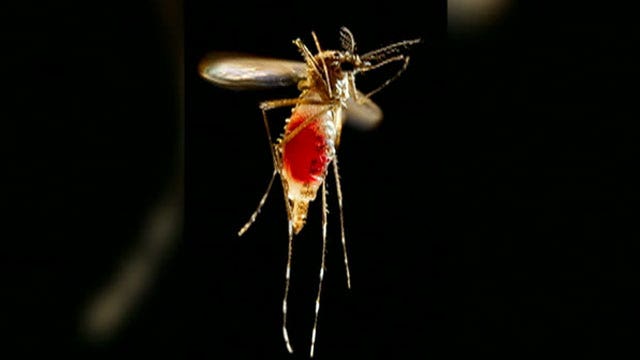A type of mosquito known to spread illnesses such as Zika virus, yellow fever, dengue, and chikungunya have been found in a Nebraska county, health officials announced this week.
The Nebraska Department of Health and Human Services (DHHS) and the Four Corners Health Department said in a statement Tuesday that Aedes aegypti mosquitoes have been identified in York County. The discovery marks the first time these mosquitoes — which are typically found in tropical climates — have been located in the state.
MICHIGAN WOMAN BLAMES EEE FOR FATHER'S DEATH, COULD MARK FOURTH IN US FROM RARE MOSQUITO-BORNE VIRUS
The mosquitoes were found during routine mosquito surveillance, which is conducted to assess how many West Nile carrying mosquitoes are in the state. But sometimes, “the mosquito traps yield unexpected findings with potential public health impact,” officials said in the news release.
Though Aedes aegypti mosquitoes are known to spread Zika virus and other diseases, “the transmission of these pathogens would require a person currently infected with such a disease to be bitten by an Aedes aegypti mosquito and then that mosquito would need to bite another uninfected person,” Dr. Tom Safranek, a state epidemiologist for DHHS, said in a statement.

Close up of Aedes aegypti mosquito identified in Nebraska. (Courtesy: Four Corners Health Department)
This means the risk of infection is low and “also dependent on the presence or arrival of an infected individual in the area,” he said.
“This discovery underscores the importance of our mosquito trapping system," Safranek added. “Tracking and monitoring the types of mosquitoes that exist in Nebraska communities is critical, which in turn helps us identify potential public health implications and implement prevention measures to reduce risk."
MASSACHUSETTS GIRL, 5, CONTRACTS DEADLY EEE VIRUS, IN CRITICAL CONDITION: REPORT
Aedes aegypti mosquitoes, which typically bite humans during the day, can only fly about 500 feet in distance, health officials said. Though it’s not currently clear how they arrived in the state, Safranek told Live Well Nebraska the insects may have arrived as eggs, possibly in used tires.
The best way to prevent mosquito-borne ailments is by draining standing water — like in birdbaths, buckets or on pool covers — as stagnant water can serve as a breeding ground for these insects. Other preventive measures include covering skin with long-sleeved pants and shirts while outside and properly using insect repellent containing DEET.

